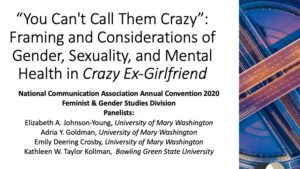Associate Professors of Communication, Dr. Adria Goldman and Dr. Elizabeth Johnson-Young, and Assistant Professor of Communication, Dr. Emily Crosby, presented at the Eastern Communication Association’s Annual Conference in Cambridge, MA. Their panel, titled “Social Media and the Changing Current of Health Messaging and Debates,” focused on research surrounding discussions of health, particularly related to diet and weight, in social media outlets. Joined by colleagues from Bunker Hill Community College and Norfolk State University, the panelists each took different topics and methodologies to explore this important area of research.
Dr. Johnson-Young’s presentation, “Sugar, Snacks, and Weight: An Examination of Posts and Parent Reactions to the Challenges of Nutritional Health Norms on the Growing Intuitive Eaters Instagram” discussed a qualitative content analysis of a popular instagram influencer’s posts and user comments. The research is rooted both health behavior theory and non-evaluative and trust-based communication around food and nutrition. Preliminary findings show a variety of themes regarding reactions to the influencer’s, Dr. Taylor Arnold, posts from anger and resistance to relief and excitement.
Dr. Goldman’s research presentation, titled “#SocialSupport: Examining the Informative and Emotional Functions of Bariatric Surgery Support Groups on Facebook” investigates the social support functions of bariatric surgery support groups. Taking a qualitative thematic analysis, this research investigates the instrumental and emotional functions identified in social support research, applying these to the specific support needs demonstrated in the literature and in the groups for bariatric surgery.
Dr. Crosby’s presentation, titled “The Digital Cult of Thinness: Critically Engaging Ozempic “Success Stories” on Social Media,” investigates the discourse surrounding Ozempic in social media platforms. Employing feminist rhetorical criticism informed by visual rhetoric scholarship, Dr. Crosby analyzes posts and commentary to identify themes and conventions that emerge from Ozempic weight loss “success stories” on social media. The aim of this research is to contribute to communication scholarship by defining a digital Cult of Thinness based on current social media conventions that promote injectable weight loss drugs for women.
- Associate Professor of Communication Elizabeth Johnson-Young
- Assistant Professor of Communication Emily Deering Crosby
- Associate Professor of Communication Adria Goldman







